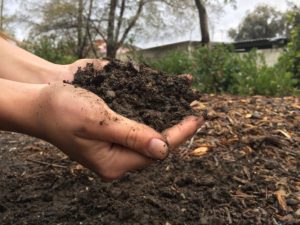Why Use Organic Fertilizers for Growing Fruits & Vegetables?
Organic fertilizers differ from chemicals, in that, they feed your plants while building the soil’s structure. Why use organic fertilizers for fruits & vegetables? Soils with lots of organic material remain loose and airy, are better able to hold moisture and nutrients, foster growth of soil organisms, including earthworms and promote healthier root development. Building a healthy soil is the key to successful organic gardening.
Another advantage of organic fertilizers is that they are made from plant and animal sources, or from rock powders. These materials need to be broken down by soil microbes in order for their nutrients to be released and that takes time. Because organic fertilizer works slowly, it provides long-term nutrition and steady, rather than excessive growth.
Also, because organic fertilizer take more time to release their nutrients, you need to apply such fertilizers at least several months before starting the planting process. Ideally, organic fertilization should be performed in the fall if you plan on spring planting. More importantly, organic fertilizers only release half of their nutrient content within the first season after being applied. In the following years, the soil is continuously fed with the remaining nutrients.
Although chemical fertilizers work faster than organic, the nutrients, in many cases, are released too quickly, creating a great deal of top growth before the roots are able to catch up. This kind of growth often leads to weaker plants. Also, because they are so rich, synthetic chemicals can easily be over applied and “burn” roots or create toxic concentration of salts.
Chemical fertilizers will not improve the structure of the soil. In fact, because they are composed of high concentrations of mineral salts, they are capable of killing off many of the soil organisms that are responsible for decomposition and soil formation. If only chemicals are added, the soil gradually loses its organic matter and microbiotic activity. As this material is used up, the soil structure breaks down, becoming lifeless, compact and less able to hold water and nutrients. The result is pretty clear – you’ll have to use more and more fertilizer.

Why Use Organic Fertilizers for Fruits & Vegetables
In addition to healthier plants and improved soil, using organic fertilizers is healthier for our bodies. Ultimately we consume what we use to feed our plants. We believe that it wiser, safer, and healthier to stay as close to the way nature was originally created, rather than taking the risk of long-term consumption of synthetic fertilizers.
In choosing an organic fertilizer, your may find some labeled “certified organic” and some “organic based.” The difference is that “organic-based” means the product is natural (not synthetic) and contains 20-25% organic based ingredients. “Certified Organic” means the products are from 100% plant or animal derived sources and have undergone 3rd party verification to ensure the integrity of ingredients meet and exceed organic standards.
Click here for a selection of organic fertilizers that we recommend.

